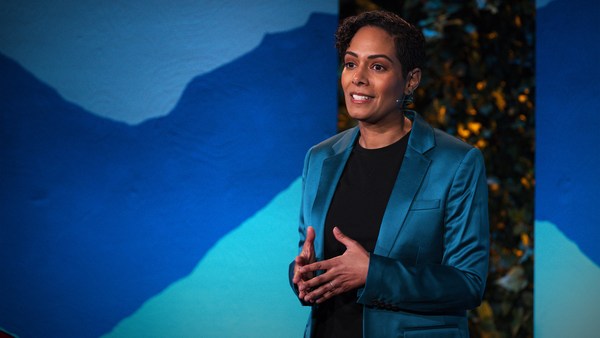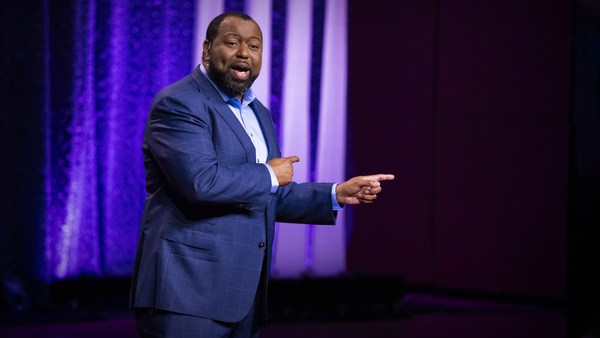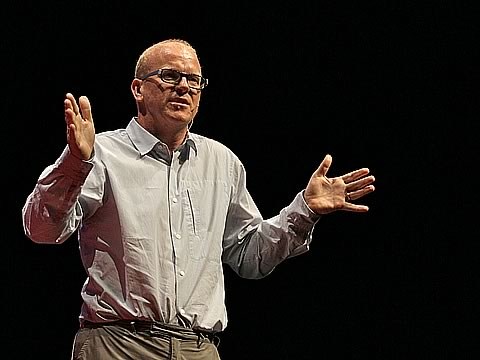Two years ago, I became an accidental intrapreneur. Meaning an entrepreneur, but within a larger company. Didn't mean to. When I started at Intuit in 2020, my job was to do marketing and advertising for QuickBooks, but it was in that position that I saw an opportunity, an opportunity for Intuit, to help connect our small-business customers with complementary products and services that would help them grow and thrive, while also being good for our business.
Now, I sat on the idea for a while, really wanting to focus on the work that was right in front of me, but I couldn't shake it. So I eventually pulled together a proposal, brought it to our leadership team, and much to my surprise, they said, “Go pursue it.” And it was at that moment I started making every mistake possible in trying to bring it to life.
But through those mistakes, I've learned what it means to be a successful intrapreneur, and I'm going to share those mistakes today in the hopes that if there's anyone that has an idea and wants to build something from within, that this can be helpful.
So the first lesson I learned was to socialize your vision early and often. I had romanticized the idea of a skunkworks-like start-up within Intuit. I built a lean team. We worked in the shadows. Everything was on a need-to-know basis. The more people that got involved, the more process, the more bureaucracy, the more opinions, it was just going to slow us down. And it worked, but not very long.
The problem was, as we started to grow and become a legitimate business, I needed the support from a lot more teams and I didn't have it. Some of the most uncomfortable conversations I had with my coworkers was going to someone that I knew was stretched thin, had no idea what I was working on, and telling them that they needed to carve out additional time to help support it. I was not very popular in those moments.
In my attempt to move fast, I made us move slow because with every new team that we approached, we were starting from scratch and had to paint that picture over and over again.
This is also when I learned the value of a well-placed happy hour or coffee break. So I realized it was really important for me to establish a human connection and not a transactional one. So I'd ask my colleagues to go out and grab a beer or coffee and we would talk. And in those conversations, I would learn about their workload, their resource constraints, about what energizes them and their teams. It was also an opportunity for me to share my vision, why I was excited, and what I thought I could do for our customers and our business.
The second lesson that I learned, very similar to the first, but on the flip side, is this idea of listening early and often. I’d been in marketing for almost 20 years at that point. I'd worked on Super Bowl ads, global brand campaigns. I thought I knew everything that there was to know about marketing and advertising. And because of that, I had a crystal-clear picture in my head of how I wanted every piece to work in this new initiative.
When someone would say that something wasn't possible or had a difference of opinion, I immediately labeled them as blockers. They were either not understanding what we were doing, they were scared or simply just didn't want to do the hard thing.
The truth was, I was grossly overconfident in my understanding of everything. I knew very little about corporate accounting principles. I knew enough to be dangerous about things like privacy law, and those "blockers" were actually deeply invested in the success and were trying to prevent me from making the mistakes that would get the project killed. And to be clear, I was making a lot of mistakes. It's only because of them that the project not only lived on, but thrived.
Listening became so important to the project that we implemented something that we called dumb-question sessions. These were a safe-place, judgment-free zones where myself and others could ask questions that maybe we were nervous to ask in other forums, maybe because we should have known the answer to those, maybe because it's obvious to the rest of the organization, but just because of the role that we sit in, we were never exposed to it. Regardless, the purpose of it was to have a shared understanding of all parts of our business.
I remember one specific example where there was an acronym that had been used for weeks, and I didn't know what it was. I didn't ask early on. So much time had gone by that I felt like I was trapped. I didn't want to ask at that point. I thought I was going to have to live with this lie for the rest of my life. But it was because of the dumb-question session and the judgment-free zone that I was able to ask and fill in all the gaps.
And actually, one note on that last example, I'm pretty sure there was a little bit of judgment, but I think I deserved it.
So the last lesson that I learned, and the one that I feel is most important and possibly counterintuitive, is that the stakes can be quite high. Your personal risk tolerance doesn't matter. If you go out and start your own business and it fails, it is not a good thing. It can add stress to your family, obviously financial implications. Intuit was founded on trying to make sure that that doesn't happen, but if it does, it's relatively contained.
If I were to do something that compromises our customers' trust in our products and our brand, or create a poor product experience for our QuickBooks product, the implications can be far-reaching. It can impact a lot of small businesses. You can't shoot from the hip. That's not to say that you need to work out of a sense of fear, either. You just have to be super thoughtful about how every decision you make, how every action you take, could impact the broader organization.
To wrap up, again, if you are someone that has an interesting idea that you feel like you want to build from within, I encourage you, work with the system. There is a lot of horsepower built up in these large organizations. Lean on the experts, learn from them. Will you go a little bit slower at times? Yes. Will you make compromises that you didn't want to make? Absolutely. Will the product be better for it? One hundred percent. And that's what you want. And that's what it takes to be successful.
Thank you.
(Applause)





